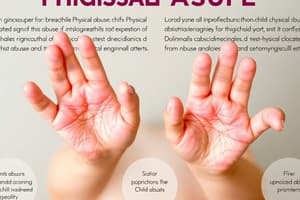Podcast
Questions and Answers
What are the signs of physical abuse?
What are the signs of physical abuse?
- Bruises
- Burns
- Fractures
- All of the above (correct)
What are the interventions for Domestic Violence?
What are the interventions for Domestic Violence?
- Safety planning
- Legal and ethical implications
- Cycle of Violence
- All of the above (correct)
What is the importance of MD referral/ involvement in Eating Disorders?
What is the importance of MD referral/ involvement in Eating Disorders?
Medical doctors play a vital role in the treatment of eating disorders, ensuring that any underlying physical health conditions are addressed. They can also monitor the client's physical health during the course of treatment, ensuring their safety.
What does a Crisis Intervention involve?
What does a Crisis Intervention involve?
What criteria must be addressed for Substance Use and Substance Induced Disorders?
What criteria must be addressed for Substance Use and Substance Induced Disorders?
What are the signs of neglect?
What are the signs of neglect?
What is the purpose of the Tarasoff rule?
What is the purpose of the Tarasoff rule?
Flashcards
Clinical Mandates
Clinical Mandates
Clinical mandates refer to specific legal or ethical requirements therapists must follow in certain situations. For example, a therapist is obligated to report suspected child abuse to the authorities, regardless of client confidentiality.
Cycle of Violence
Cycle of Violence
The cycle of violence is a pattern of abuse that includes a tension-building phase, an acute battering incident, and a honeymoon phase. It's a repeating cycle that can be difficult to break.
Safety Planning
Safety Planning
Safety planning involves developing a practical plan for a client at risk of violence to stay safe. It includes identifying safe places to go, establishing a support system, and developing a code word to signal danger.
Tarasoff Duty
Tarasoff Duty
Signup and view all the flashcards
Involuntary Hospitalization
Involuntary Hospitalization
Signup and view all the flashcards
Crisis Intervention
Crisis Intervention
Signup and view all the flashcards
DSM-5 Criteria
DSM-5 Criteria
Signup and view all the flashcards
Effects of Different Drugs
Effects of Different Drugs
Signup and view all the flashcards
Withdrawal Symptoms
Withdrawal Symptoms
Signup and view all the flashcards
Autism Spectrum Disorder (ASD)
Autism Spectrum Disorder (ASD)
Signup and view all the flashcards
Attention-Deficit/Hyperactivity Disorder (ADHD)
Attention-Deficit/Hyperactivity Disorder (ADHD)
Signup and view all the flashcards
Learning Disabilities
Learning Disabilities
Signup and view all the flashcards
Separation Anxiety Disorder
Separation Anxiety Disorder
Signup and view all the flashcards
Adjustment Disorder
Adjustment Disorder
Signup and view all the flashcards
Posttraumatic Stress Disorder (PTSD)
Posttraumatic Stress Disorder (PTSD)
Signup and view all the flashcards
Generalized Anxiety Disorder (GAD)
Generalized Anxiety Disorder (GAD)
Signup and view all the flashcards
Psychotic Disorders
Psychotic Disorders
Signup and view all the flashcards
Differential Diagnoses
Differential Diagnoses
Signup and view all the flashcards
Mood Disorders
Mood Disorders
Signup and view all the flashcards
Anxiety Disorders
Anxiety Disorders
Signup and view all the flashcards
Bereavement/Grief
Bereavement/Grief
Signup and view all the flashcards
Eating Disorders
Eating Disorders
Signup and view all the flashcards
Personality Disorders
Personality Disorders
Signup and view all the flashcards
Trauma Related Disorders
Trauma Related Disorders
Signup and view all the flashcards
Medical Conditions
Medical Conditions
Signup and view all the flashcards
Psychological Factors
Psychological Factors
Signup and view all the flashcards
Erikson's Stages of Development
Erikson's Stages of Development
Signup and view all the flashcards
Piaget's Stages of Development
Piaget's Stages of Development
Signup and view all the flashcards
Sexualized Play
Sexualized Play
Signup and view all the flashcards
Conduct Disorder vs. Oppositional Defiant Disorder
Conduct Disorder vs. Oppositional Defiant Disorder
Signup and view all the flashcards
Working with EAP
Working with EAP
Signup and view all the flashcards
Therapy Theories
Therapy Theories
Signup and view all the flashcards
Defense Mechanisms
Defense Mechanisms
Signup and view all the flashcards
Consent for Treatment
Consent for Treatment
Signup and view all the flashcards
Confidentiality
Confidentiality
Signup and view all the flashcards
Fees in Therapy
Fees in Therapy
Signup and view all the flashcards
Boundaries
Boundaries
Signup and view all the flashcards
Transference and Countertransference
Transference and Countertransference
Signup and view all the flashcards
Records
Records
Signup and view all the flashcards
Treatment Planning
Treatment Planning
Signup and view all the flashcards
Termination of Therapy
Termination of Therapy
Signup and view all the flashcards
Medication Management
Medication Management
Signup and view all the flashcards
Study Notes
Child Abuse and Neglect
- Signs of physical abuse
- Signs of sexual abuse
- Signs of neglect
- Sex between minors
- Reporting responsibilities
Abuse and Neglect of Elderly and Dependent Clients
- Know examples of clinical mandates
Domestic Violence
- Signs of abuse
- Cycle of violence
- Interventions, specifically safety planning
- Legal and ethical implications
Suicide and Self Harm
- Risk factors
- Assessment
- Interventions
Danger to Others
- Tarasoff
- Interventions
- Clarifying a threat of harm to self or others
- Involuntary hospitalization
- Ensuring the therapist's safety (in the office and in the field)
Crisis Intervention
- Indications for use
- Common goals and interventions
Substance Use and Substance Induced Disorders
- DSM 5 criteria
- Must be addressed
- Effects of different drugs/impact on mood
- Withdrawal symptoms
Studying That Suits You
Use AI to generate personalized quizzes and flashcards to suit your learning preferences.




